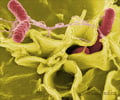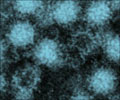Debilitating diarrhea is a widespread concern among the medical community as it is linked to significant mortality.
Debilitating diarrhea is a widespread concern among the medical community as it is linked to significant mortality.
A combination of two fully human monoclonal antibodies developed by MassBiologics (MBL) of the University of Massachusetts Medical School (UMMS) and Medarex, a wholly owned subsidiary of Bristol-Myers Squibb Co. (NYSE:BMY), when given with standard antibiotics, was shown to reduce recurrence of a debilitating form of diarrhea by 72 percent in patients enrolled in a Phase 2 clinical trial. The results of the trial are reported in the article "Treatment with Monoclonal Antibodies against Clostridium difficile Toxins" to be published January 21, 2010 in the New England Journal of Medicine (NEJM)."We are pleased that this new treatment had such a significant impact for these patients," said Donna Ambrosino, MD, executive director of MassBiologics, professor of pediatrics at UMMS and senior author of the NEJM paper. "This disease is a growing public health problem and the need for effective treatment options is quite clear. The team at MBL is gratified that we have been able to discover effective antibodies, and then translate the discovery to a product with the collaboration of our colleagues at Medarex."
Clostridium difficile (C. difficile) is a common bacterium that can colonize the human gastrointestinal tract. C. difficile can cause disease when patients are treated with antibiotics for other infections and C. difficile then grows unchecked in the gastrointestinal tract, producing large amounts of two toxins, commonly called toxin A and toxin B. The toxins can cause severe diarrhea and damage the lining of the large intestine. The incidence of C. difficile infection (CDI) in the United States is rapidly increasing, with rates doubling from 2000 to 2005.
C. difficile infects more than 300,000 people each year in the United States and is most common among hospitalized patients and residents of long-term care facilities. Furthermore, the emergence of an epidemic strain of C. difficile has been implicated in severe outbreaks of CDI in the United States, Canada and the United Kingdom, and has affected otherwise healthy individuals in the community. The virulence of the epidemic strain has been attributed, at least in part, to the bacteria's markedly increased efficiency in producing both toxins A and B. The epidemic strain appears to cause both more severe illness initially, and a subsequently higher rate of relapse.
To combat this emerging public health problem, researchers at MassBiologics and Medarex worked to develop fully human antibodies that could neutralize both toxins generated by C. difficile. In the current study reported in the NEJM, 200 patients with CDI were enrolled in a randomized, double-blind, placebo-controlled Phase 2 trial. The trial was conducted at 30 locations in the United States and Canada from July 2006 through April of 2008. Patients were divided into two groups and received either a single injection of the two antibodies, or a placebo, in addition to the standard of care antibiotic treatments for CDI. The patients were followed for 84 days to see how many would suffer a recurrence of the disease.
The results showed only 7 percent of those patients who received the antibodies suffered a recurrence, while 25 percent of those who received the placebo had a recurrence—a 72 percent reduction in recurrence. Of the 44 patients infected with the epidemic strain of C. difficile, only 8 percent who received the antibodies suffered a recurrence compared with 32 percent of those who received the placebo. "The trial results are impressive," Lorraine Kyne, MD, MPH, wrote in an NEJM editorial accompanying the paper's publication. "This novel nonantibiotic approach to secondary prevention is likely to offer hope to physicians and patients battling C. difficile infection."
Advertisement
The rights to commercialize the two new antibodies against C. difficile toxins have been licensed to Merck & Co.
Advertisement
Source-Eurekalert
RAS














